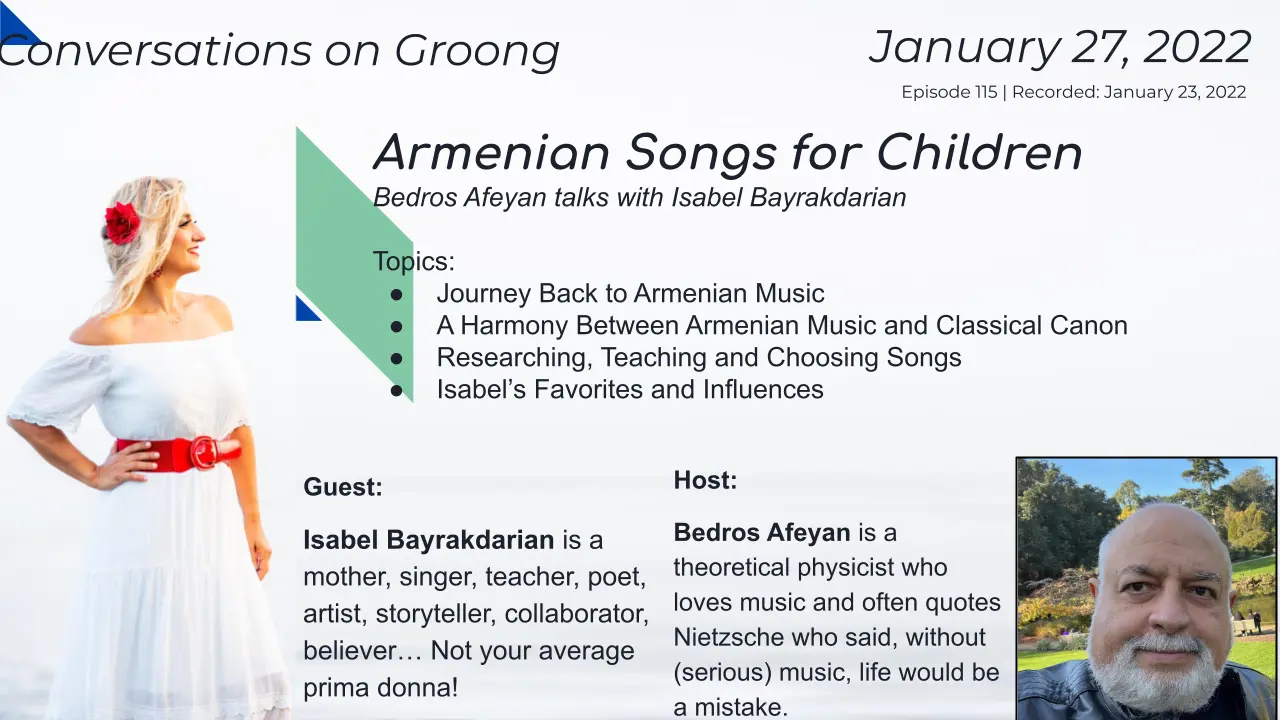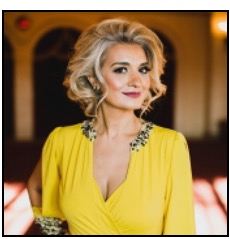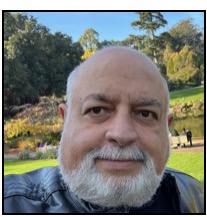
Armenian Songs for Children Bedros Afeyan talks with Isabel Bayrakdarian
Groong Links:
Topics:
- Journey Back to Armenian Music
- Musical Harmony Between Armenian Music and Classical Canon
- Researching, Teaching and Choosing Songs
- Isabel’s Favorites and Influences
Guest:
Host:
Song Excerpts list & timestamps: (Note: All excerpts used with permission)
- 00:00 Komitas - Sleep My Child - Lullaby
- 01:35 Komitas - Six Children’s Songs
- 27:03 Ganachian - The Swallow / Tsitsernak
- 29:06 Komitas - Little Wooden Horse
- 41:57 & 45:00 & 46:42 Tumajan - Cradle Song - Lullaby from Putanya
- 56:12 Ganachian – Peaceful Night
- 01:05:43 Tumajan - 2 Playsongs from Agn Region
- 01:10:50 Tumajan - Orrim - Lullaby from Putanya
- 01:16:03 Ganachian - Serenade
- 00:17:11 Ganachian - Bjingo
Episode 115 | Recorded on Sunday, January 23, 2022
Show Notes
Komitas - Six Children’s Songs – Timestamp: 00:01:35
Internationally acclaimed soprano, Lebanese-born, Canadian-Armenian-American Isabel Bayrakdarian has released an album that draws on five generations of her family - from her great-grandparents to her own children.
Well, I was a child once where she was a child, 15 years later, namely, Beirut, Lebanon. And we both sang as acolytes in the Armenian Apostolic church - we sang the same mass, the same ancient hymns, wearing the same robes and sliding around in the same hand-me-down slippers. Then we both left Lebanon and settled in Canada, Montreal for me, Toronto for her, finished high school and studied engineering in college. Many years apart mind you! And now we are both living in sunny CA.
Somewhere in the middle of all that, of course, she became a famous opera singer, and I did not. But we are both still very much Armenian, passionately devoted to music, so I thought: what a wonderful opportunity to talk and explore what makes her tick! How she came to choose music and singing over biochemical engineering, how she views those decisions now, what are her favorite genres of classical music? How she prepares? How she maintains her voice? How she does the musical scholarship to unearth and dust off over a hundred-year-old village songs, intonations, accents, traditional renditions, resurrecting Agn, Ani, Bitlis, Diktanagerd, Bardizag, Bursa, Van, or Gesaria, among many other ashes of the Armenian Genocide, as well as parenthood, being a professor at UCSB, and in her spare time, a diva, a superstar, an award-winning international recording artist.
We have met on a number of occasions in the past. I first learned about you from my mother who was excited to hear that you were from Zahleh, when you won your voice international competition and CBC was all over it. Your album Joyous Light, 2002, made an indelible impression on me, and that reverberated in Atom Egoyan’s film Ararat, which I reviewed for Groong, 20 years ago now. I also remember the album and movie The Journey Home.
(1) How did that journey back to Armenian music happen? How did you manage learning classical music and training your operatic voice while attending the prestigious University of Toronto, studying engineering, of all subjects?
(2) Ganachian - The Swallow – Timestamp: 00:27:03
How would you characterize the differences between or the overall musical harmony uniting Armenian music, whether it be traditional, village heritage based, or Gomidas transcribed, vs the Western canon which you sing professionally, from Italian Operas to German Lieder to South American Tango gems? That’s quite a span!
(3) Gomidas - Little Wooden Horse – Timestamp: 00:29:06
Let’s talk about the new album: Armenian Songs for Children.
It is ethnomusicology par excellence! Bartok or Gomidas (or Ravel or Dvorak) have nothing on you! You have unearthed Armenian musical and expressive gems lost to the cruelties of time and conquerors past over a vast list landmass, Western Armenia. The songs of village folk, resurrected in your hands and brought back to life like an injured bird on a trembling windowsill on a cold winter morning, saved by you to find flight and gently soar away.
Tumajan - Cradle Song - Lullaby from Putanya – Timestamp: 00:41:57 & 00:45:00 & 00:46:42
Tell us about your song choices, the hard work of mastering and rendering them so beautifully accompanied with just a virtuoso harp and a virtuoso flute, by Ellie Choate and Ray Furata. Masterful simplicity and purity of sound, if I may be so bold as to say!
Tumajan – The Scarecrow - Playsong from Kharpert – Timestamp: 00:55:46
(4) Ganachian – Peaceful Night – Timestamp: 00:56:12
What are your musical ambitions? Not yet reached summits? Dreams? Aspirations? Besides teaching the next generation which you are busy doing, of course.
(5) Isabel, can you lead us through a typical day for you, if such a thing can be described. Say you are back home, during the semester, UCSB is open, and the children are in school, what is your day like? And then when you are on the road and away from home. How do you prepare, rehearse, choose your repertoire, expand it, do the groundwork before the flashing lights of the stage and your powerful voice capture the rest of the night in a blazing glory?
(6) Tumajan - 2 Playsongs from Agn Region – Timestamp: 01:05:43
What books have influenced you the most? What composers? What singers? What musicians? What movie makers? What thinkers? Philosophers? Poets? Novelists? Painters?
(7) Tumajan - Orrim - Lullaby from Putanya – Timestamp: 01:10:50
I know you write poetry yourself. Can you read something of yours here, on the air, for your fans?
(8) You knew I was going to ask this. Can you also sing one of the bird songs from your wonderful and enchanting album of Armenian Songs for Children? My favorite incidentally, among 28 other masterpieces, is the lament or sorrowful song full of chagrin: Serenade. Sing one for us, Isabel?
Ganachian - Serenade – Timestamp: 01:16:03
Ganachian - Bjingo – Timestamp: 01:17:11
Wrap-up
All right, that’s our show, we hope you found it useful. Please find us on Social Media and follow us everywhere you get your Armenian news, the links are in the show notes. Thanks to Laura Osborn for the music on our podcasts. We’ll talk to you soon!
Guests

Isabel Bayrakdarian
Isabel Bayrakdarian who is a mother, singer, teacher, poet, artist, storyteller, collaborator, believer… Not your average prima donna!
Hosts

Bedros Afeyan
Dr. Bedros Afeyan is a theoretical physicist specializing in plasma physics and laser fusion since 1980. He also paints, sculpts and writes poetry. He is keenly interested in classical music, classical guitar, theater, cinema, and chess. He lives and works in Palo Alto with his wife Mariné. They have been together since the day they met in March, 1998. He is the current editor of The Literary Groong.

Asbed Bedrossian
Asbed Bedrossian is an IT professional, and for years oversaw the central IT enterprise infrastructure and services at USC. His decades of experience spanned across IT strategy, enterprise architecture, infrastructure, cybersecurity, enterprise applications, data center operations, high performance computing, ITSM, ITPM, and more.
Asbed founded the Armenian News Network Groong circa 1989/1990, and co-founded the ANN/Groong podcast in 2020.